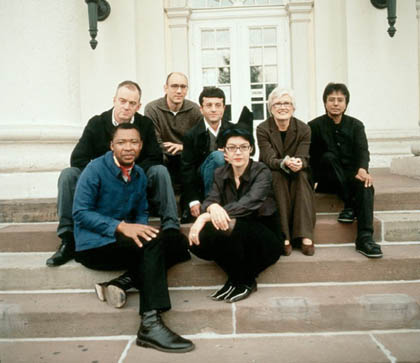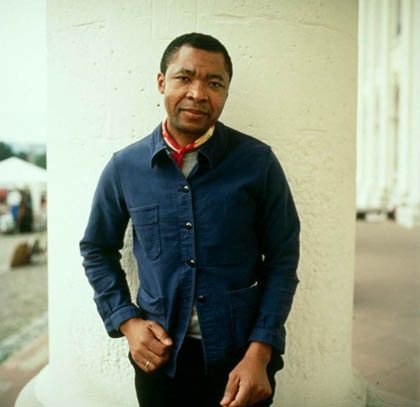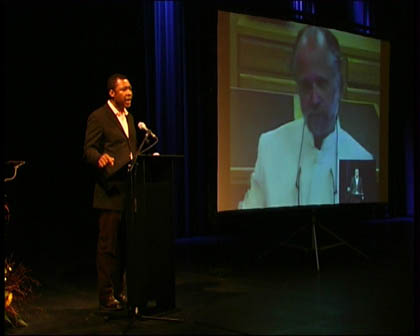DOCUMENTA 11
“Are we witnessing a globalisation of the economy? Definitely. A globalisation of political strategies? Undoubtedly. But a universalisation of political conscience, certainly not” (Michel Foucault, 1979)
It is with this quote that Homi K Bhabha (professor of Language and English and American Literature and African Studies at Harvard University, Cambridge and Massachusetts) opens his speech for Platform1, theoretical backdrop and cultural opener for Documenta 11.

Okwui Enwezor, Artistic Director of Documenta11 and the Co-Curators (left to right) Mark Nash, Okwui Enwezor, Carlos Basualdo, Octavio Zaya, Ute Meta Bauer, Susanne Ghez, Sarat Maharaj. Photo: Werner Maschmann © Documenta
The eleventh edition of Documenta, one of the most important exhibitions of contemporary art around the world will take place from 8 June to 15 September 2002 in Kassel, Germany; the curator this year is Okwui Enwezor. Taking place every five years, Documenta was created symbolically in post war Germany since which time it has grown considerably. The last edition was in 1997, organised by Catherine David, who since January has been director of Witte de With in Rotterdam; it was noted not just for its multi-disciplinary approach but also for its strong interest in non Western territorial realities which are usually presented as “esoteric” artistic expressions rather than autonomous pieces, when not actually ignored. Around the same period for example, the Venice Biennale under Germano Celant with its demanding title “Future Present Past”, concentrated on a universe which was entirely western.

Okwui Enwezor, Artistic Director of Documenta 11 Photo: Werner Maschmann © Documenta
Curator Okwui Enwezor, born in Nigeria in 1963 (working between New York, London, Chicago and Kassel) is famed for his successful organisation of the Johannesburg Biennale in 1997 along with his interest in the contemporary African art scene as well as in art which explores a social and political commitment in favour of racial minorities. In other words, an approach which is both multi cultural and decidedly interdisciplinary.
To fill in time before June, draw the attention of the public and to render the tensions of contemporary culture more explicit, Enwezor has created a theoretical build up to the event. Four Platforms are planned – Documenta 11 will be Platform 5 – each with a central theme and a chosen city: Vienna, Berlin, New Delhi, St Lucia and Lagos. Each Platform is made up of conferences, symposia, debates, seminars, readings, book and film presentations, the acts of which will then be collected and published.

Okwui Enwezor at the Platform 1 conference, during the speech by Bhabha
Platform 1 is divided between Vienna and the House of World Cultures in Berlin with five days of conferences on the theme “Democracy Unrealised” Homi K. Bhabha, an Indian of mixed background is one of the speakers; he discusses the fragility of contemporary democracies, the victims of those never realised, the contradictions and possible revisions in the globalisation processes of the twenty first century, discussed and reconsidered after the terrible reawakening of the American September.
He considers the urgent need for human and historical reflections on recent happenings, the apocalyptic images of death and destruction in New York, the rage and terror experienced by that which defines “a moral universe alien to our own” and the consciousness of the failure of democracy on its fundamental principles. Likewise an increase of nationalism and fundamentalism of every kind: dangerous errors which he feels are still perpetuated today with erroneous interpretations of the events taken place.
Read more ...





